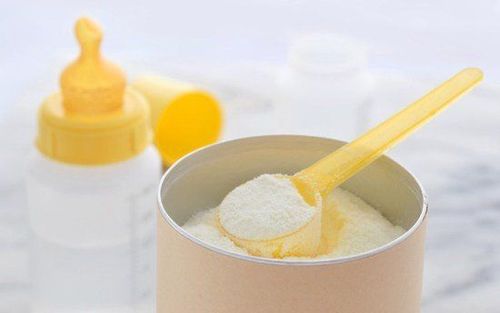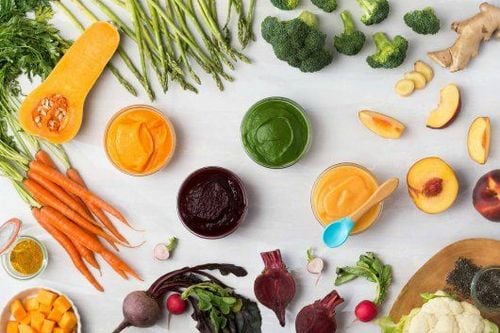This is an automatically translated article.
The article is expertly consulted by Master, Doctor Nguyen Minh Tuan - Pediatrician - Pediatrics - Neonatology - Vinmec Danang International General Hospital.When babies are 10 months old, their main source of nutrition is still breast milk or formula. However, besides that, children can eat other complementary foods. Below is the nutrition and oral care regimen for 10-month-old children, parents can refer to to supplement nutrition and protect their children's teeth firmly.
1. Nutrition for 10-month-old children
1.1 What can a 10-month-old baby eat? 10-month-old babies can eat the foods that their parents eat such as: fruits, cereals, vegetables, unsweetened yogurt, meat, cheese... Parents should give children foods in different groups , especially fruits and vegetables. At this age, children can pick up or scoop food on their own. Parents should not worry too much about your child dropping food at home, picking or eating by himself plays an important role in developing children's hand-mouth coordination skills.Foods that a 10 month old baby can eat include:
Vegetables: Carrots, peas, green beans, spinach (green leafy vegetables), squash, potatoes, cut sweet potatoes small pieces.. Cooked beans Well-cooked meat, poultry and fish Egg yolks 1.2 Foods that should not be given to babies The chewing - swallowing and digestion skills of a 10-month-old baby are not really perfect, Therefore, parents should note that children should not eat foods that are difficult to digest, difficult to swallow such as:
Fruits in whole pieces Hard to chew meat, large pieces Popcorn, nuts Olives, Honey, Cow's milk. .. Candies, desserts, soft drinks .... To learn about the development of 10-month-old children, parents can refer to 10-month-old babies know what to do?
1.3 Milk intake for a 10-month-old Baby Breast milk or formula is still the main food for a 10-month-old baby. The 10-month baby feeding schedule should include 3-4 milk meals per day. Your baby should drink at least 700 to 950 ml of breast milk or formula every 24 hours.

Khi trẻ được 10 tháng tuổi, nguồn dinh dưỡng chính của trẻ vẫn là sữa mẹ hoặc sữa công thức

Trẻ 10 tháng tuổi có thể ăn được những thực phẩm mà cha mẹ ăn như: trái cây, ngũ cốc, rau, sữa chua không đường, thịt, phô mai...
2. Dental care for 10-month-old children
2.1 Dental care for children Most 10-month-old children have 4 teeth, they can bite and chew but mainly crush food with their front teeth and gums. Therefore, parents need to regularly clean their children's teeth to help them have strong teeth.For babies not teething: Mothers can clean their children's teeth by using gauze or soft cloth dipped in physiological saline or warm water, then gently wipe the child's gums once a day.
For teething babies: Mothers can use a soft brush and a clean, soft cloth to clean the teeth of 10-month-old babies. When brushing children's teeth, the mother should pay attention to place the bristles towards the gum line about 45 degrees, rotate the brush and brush each group of teeth (about 2-3 teeth), clean all 3 sides of the teeth including the outer surface, the inner surface of the teeth and the outer surface of the teeth. inside and chewing surface.
Parents can learn more: Notes on oral hygiene for babies in the weaning age
During oral hygiene for children, mothers should create a fun atmosphere for children to enjoy and remember to brush their teeth with jocundity. Make it a habit to clean your child's teeth at least twice a day.
2.2 Notes in the process of oral hygiene for children To ensure oral hygiene for children, parents should pay attention to cleaning pacifiers, chewing gums, milk bottles, avoiding kissing in the mouth area of children to Limit the transmission of bacteria to children. Do not allow children to suck on their thumbs or overuse pacifiers, which can cause teeth to grow unevenly and out of alignment. Give your child foods with a hardness suitable for the child's teeth development according to age. Besides, parents should also take their children to regular dental check-ups at least every 3-6 months so that the doctor can assess the child's oral health regularly.

Để đảm bảo vệ sinh răng miệng cho trẻ, cha mẹ nên lưu ý vệ sinh núm vú giả
In addition, parents should also apply some methods of changing habits and improving nutrition to support the child's teeth to develop better.
Besides, parents also need to supplement their children with essential micro-minerals such as zinc, lysine, chromium, selenium, vitamin B1, ... to fully meet the nutritional needs of children. The addition of these essential vitamins also supports digestion, enhances nutrient absorption, improves anorexia, and helps children eat well. Parents can simultaneously apply dietary supplements and functional foods derived from nature for easy absorption. The most important thing is that improving your baby's symptoms often takes a long time. The combination of many types of functional foods at the same time or continuously changing many types in a short time can cause the baby's digestive system not to adapt and completely not good. Therefore, parents must be really patient with their children and regularly visit the website vimec.com to update useful baby care information.














